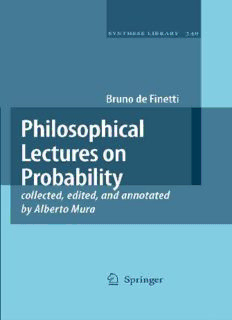Table Of ContentPHILOSOPHICALLECTURESONPROBABILITY
SYNTHESE LIBRARY
STUDIESINEPISTEMOLOGY,
LOGIC,METHODOLOGY,ANDPHILOSOPHYOFSCIENCE
Editor-in-Chief:
VINCENTF.HENDRICKS,RoskildeUniversity,Roskilde,Denmark
JOHNSYMONS,UniversityofTexasatElPaso,U.S.A.
HonoraryEditor:
JAAKKOHINTIKKA,BostonUniversity,U.S.A.
Editors:
DIRKVANDALEN,UniversityofUtrecht,TheNetherlands
THEOA.F.KUIPERS,UniversityofGroningen,TheNetherlands
TEDDYSEIDENFELD,CarnegieMellonUniversity,U.S.A.
PATRICKSUPPES,StanfordUniversity,California,U.S.A.
JANWOLEN´SKI,JagiellonianUniversity,Krako´w,Poland
VOLUME340
Bruno de Finetti
PHILOSOPHICAL
LECTURES ON
PROBABILITY
COLLECTED, EDITED,
AND ANNOTATED
BY
AlbertoMura
UniversityofSassari,Italy
With an Introductory Essay by
MariaCarlaGalavotti
Translated by
HykelHosni
123
Author
Editor
†
BrunodeFinetti
AlbertoMura
Universita`degliStudidiSassari
Dipto.diTeorieericerchedeisistemi
culturali
PiazzaContediMoriana,8
07100Sassari
Italy
[email protected]
ThistranslationwassupportedbytheAlexandervonHumboldtFoundation,theGermanFederalMin-
istryofEducationandResearchandtheProgramfortheInvestmentintheFuture(ZIP)oftheGerman
GovernmentthroughaSofjaKovalevskajaAward,aswellastheItalianuniversitiesofPisaandSassari.
ISBN:978-1-4020-8201-6 e-ISBN:978-1-4020-8202-3
LibraryofCongressControlNumber:2007943065
(cid:2)c 2008SpringerScience+BusinessMediaB.V.
Nopartofthisworkmaybereproduced,storedinaretrievalsystem,ortransmitted
inanyformorbyanymeans,electronic,mechanical,photocopying,microfilming,recording
orotherwise,withoutwrittenpermissionfromthePublisher,withtheexception
ofanymaterialsuppliedspecificallyforthepurposeofbeingentered
andexecutedonacomputersystem,forexclusiveusebythepurchaserofthework.
Printedonacid-freepaper
9 8 7 6 5 4 3 2 1
springer.com
Contents
Preface............................................................ ix
Editor’sNotice..................................................... xiii
DeFinetti’sPhilosophyofProbability................................. xv
1 IntroductoryLecture ............................................ 1
AgainsttheAxiomaticApproach ................................... 1
Subjectivism .................................................... 3
DefiningProbability .............................................. 4
ProperScoringRules ............................................. 4
2 DecisionsandProperScoringRules ............................... 15
WhyProperScoringRulesAreProper............................... 15
ProbabilityDependsontheSubject’sStateofInformation .............. 18
SequentialDecisions.............................................. 19
SubjectivismversusObjectivism.................................... 21
ForanOmniscientBeingProbabilityWouldNotExist ................. 23
3 GeometricRepresentationofBrier’sRule.......................... 27
EnvelopeFormedbyStraightLines ................................. 27
OperationalDefinitionofProbability ................................ 28
4 Bayes’Theorem................................................. 31
Bayes’TheoremandLinearity...................................... 31
StatisticsandInitialProbabilities ................................... 34
BayesianUpdatingisNotaCorrectiveRevision....................... 35
“Adhockeries” ................................................... 36
Bayes’TheoremforRandomQuantities ............................. 37
InexpressibleEvidence............................................ 39
5 PhysicalProbabilityandComplexity .............................. 47
“Perfect”Dice ................................................... 47
TheLotteryParadox .............................................. 49
v
vi Contents
ProbabilityasFrequency .......................................... 50
ProbabilityandPhysicalLaws...................................... 51
ProbabilisticTheoriesasInstruments ................................ 53
RandomSequences............................................... 54
6 StochasticIndependenceandRandomSequences ................... 59
LogicalandStochasticIndependence................................ 59
Propensities ..................................................... 60
IndependenceandFrequentism ..................................... 61
VonMisesCollectives............................................. 62
7 SuperstitionandFrequentism..................................... 69
TheFrequentistFallacy ........................................... 69
IdealizedFrameworks............................................. 71
TheFallacyofHypothesisTesting .................................. 72
8 Exchangeability................................................. 75
UrnDrawingswithReplacementbutWithoutIndependence............. 75
Inductionand“Unknown”Probabilities.............................. 78
ExchangeableRandomQuantities................................... 80
AllegedObjectivityandConvergenceofSubjectiveProbabilities......... 81
9 Distributions.................................................... 87
IntroductoryConcepts ............................................ 87
CumulativeDistributions .......................................... 89
ContinuousDistributionsWithoutDensity............................ 90
TheGeneralCase ................................................ 93
CharacteristicFunctions........................................... 93
AboutMeans .................................................... 95
10 TheConceptofMean ............................................ 97
Chisini’sSerendipity.............................................. 97
Γ-MeansandtheNagumo-KolmogorovTheorem .....................100
StatisticalTheoryofExtremesandAssociativeMeans..................102
InequalitiesAmongAssociativeMeans ..............................104
ConcludingRemarks..............................................105
11 InductionandSampleRandomization .............................109
ExchangeabilityandConvergencetotheObservedFrequency ...........109
BayesianStatisticsandSampleRandomization........................110
12 CompleteAdditivityandZeroProbabilities ........................113
TheBettingFrameworkandItsLimits...............................113
FiniteandCountableAdditivity.....................................114
‘Strict’Coherence................................................118
Contents vii
ConditioningonEventsofZeroProbability...........................120
Allais’Paradox ..................................................123
13 TheDefinitionsofProbability.....................................127
Axiomatic,Classical,andFrequentisticApproaches ...................127
IndistinguishableEventsandEqualProbability........................130
FrequentismandExchangeability ...................................131
VonMises’“Regellosigkeitsaxiom” .................................134
14 TheGambler’sFallacy...........................................137
AgainsttheMeasure-TheoreticApproach ............................137
Gambler’sFallacyandFrequentistFallacy............................140
EventsandPropositions ...........................................144
15 “Facts”and“Events” ............................................149
APragmaticViewofEvents .......................................149
OnElementaryFacts..............................................152
Eventsand“Phenomena”..........................................155
16 “Facts”and“Events”:AnExample ...............................159
ASequenceofCoinTosses ........................................159
AGraphicalRepresentation........................................161
17 Prevision,RandomQuantities,andTrievents .......................165
ProbabilityasaSpecialCaseofPrevision ............................165
TheConglomerativeProperty ......................................167
Trievents........................................................169
18 De´sire´ Andre´’sArgument ........................................177
HeadsandTails:TheGambler’sRuin................................177
TheWiener-Le´vyProcess .........................................180
AgainonGambler’sRuin..........................................180
TheBallotProblem...............................................182
ThePowerofDe´sire´ Andre´’sArgumentativeStrategy ..................183
19 CharacteristicFunctions .........................................185
PrevisionandLinearity............................................185
RotationsintheComplexPlane.....................................186
SomeImportantCharacteristicFunctions.............................188
ConcludingRemarks..............................................189
CitedLiterature....................................................191
NameIndex........................................................209
Preface
This book is a substantially revised and updated version of the volume Filosofia
dellaprobabilita` (PhilosophyofProbability)publishedinItalianin1995,tenyears
afterthedeathofBrunodeFinetti.ItisnotaworkleftinwrittenformbydeFinetti
butcomesfromthetranscriptionsofthetapesrecordingacourseforgraduatestu-
dentsheldbydeFinettiin1979atthe“Istitutonazionaledialtamatematica”(Na-
tionalInstituteforAdvancedMathematics)inRome.Toproperlyreflecttheorigin
ofthepublishedmaterial,anewtitlehasbeenchosenforthepresentedition.
Thelectures—whichwereheldorally,withoutthesupportofanywrittentext—
wererecordedwiththeaimofhavingthempublished.ForthatreasondeFinettiand
I had agreed on the recordingof the lectures and his later editing of the resulting
text.With thisprojectin mind,alongwiththe recordingontape,I tooknumerous
notesand,aboveall,InotedcarefullyeverythingdeFinettiwroteontheblackboard
duringthelectures.
Unfortunately, the original project could not be realized: other commitments
forcedmetoputoffthetranscriptionofthetapes.Later,thepoorhealthofdeFinetti
madethisimpossible.Onlymanyyearslater,ontheoccasionofthetenthanniver-
saryofthedeathofdeFinettididIhavetheideaoftranscribingthoseoldtapesand
publishingthem with commentsand notes. Giventhe rather informalcharacterof
deFinetti’slectures,thetranscriptionrequiredsomeeditinginordertobepublished
asawrittentext.Thisworkwasundertakenscrupulouslyinordertoavoidaltering
deFinetti’sideas.
Althoughoriginallyitwasaimedatanaudiencecomposedmainlyofmathemati-
cians,thecoursedoesnothave,excepttoasmalldegree,thecharacterofamathe-
maticscourse:insteaditisratheraseriesoflecturesinphilosophyofprobability,in
whichdeFinettidealsindetailwithalmostallthethemesofhissubject.
Thisworkthereforepresentsanexposition,alsoaccessibletoreadersnottrained
in mathematics,ofthe ideasofthe fatherof oneof themostimportantphilosoph-
ical and scientific schools of thought, which emerged in the past century and are
becomingmoreandmorepopularinthepresentone:theneo-Bayesianschool.
The intended spirit of the course is well illustrated in the “notice” which de
FinettihimselfwrotetobedisplayedontheInstitute’snotice-board:
ix
x Preface
Thecourse,withadeliberatelygenerictitle[“OnProbability”]willdealwiththeconceptual
andcontroversialquestionsonthesubjectofprobability:questionswhichitisnecessaryto
resolve,onewayoranother,sothatthedevelopmentofreasoningisnotreducedtoamere
formalistic game of mathematical expressions or tovacuous and simplisticpseudophilo-
sophicalstatementsorallegedlypracticalclaims.
Thenoticemade itveryclearwhatthe threetargetsof de Finetti’scriticism were:
(1) the formalism of those who see in the theory of probability a branch of an
abstract systems of axioms; (2) the “vacuous and simplistic pseudophilosophi-
cal statements”: an allusion to the various “definitions” of probability (such as
frequency-limit,or “ratio between the number of favorable cases and the number
of equally possible cases,” and so forth) which he judged as superficialand with-
outcontent;(3) “allegedly practical” behaviorof those who consider as irrelevant
thephilosophicalquestions(or“conceptual”asde Finettipreferredto say)forthe
applicationofthecalculusofprobabilityinconcretesituations.
In the first few daysof the course there were aboutten people attending.Most
of them were graduate students of the ordinary courses of the Institute, but there
werealsootherstudents.Thenumberreducedwithtime.Thepresenceofalimited
audiencemeantthatthecoursetookonthecharacterofaninformalandinteractive
seminar.Usually,asthereadercanrealize,theseminarswereaseriesofdiscussions
aboutvariousaspectsofthephilosophyofprobability.
Thelecturescontainnumerousobservationsandcomments,whichareinteresting
indefiningdeFinetti’sphilosophyofprobability.Forexample,notetheinteresting
observationsoninductivedynamics(Chapter4)orphysicalprobability(Chapter5,
thedistinction—newandimportantinseveralrespects—betweenfactsandevents
(Chapters15 and 16), the thesis accordingto which the meaning of a proposition
candependonempiricalconditions(Chapter17).
AlthoughIaddedormodifiednumerousnotestothetextwithrespecttothefirst
Italian edition, the text from de Finetti’s lectures has been translated into English
withoutfurtherediting.
When de Finetti ran the course I had known him for about a year. Around the
end of 1977, Professor Francesco Barone (1923–2001),whose student I was, had
the good idea of putting me in touch with de Finetti. When I went to visit him at
hishomeinRome,deFinettiwelcomedmewarmlyandIhadaconversationwith
him which lasted for more than five hours. That was the first of a long series of
meetings,thankstowhichIhadtheprivilegeoftalkingtohimabouteveryaspectof
myresearch.Atoneofthesemeetings,whichtookplaceatthebeginningof1979,
hetoldmehehadacceptedtheinvitationtoholdthecoursepresentedinthisvolume.
Onthatoccasionhewarmlyaskedmetotakepart,“alsobecause—hesaid—the
presenceofapersonalreadyintroducedtothephilosophicalproblemsofprobability
couldbeinteresting.”
IwouldliketotakethisoccasiontoexpressthedebtIfeelIhavetowardsBruno
de Finetti. The impact that the meeting with him had on my education was deci-
sive,hisideaofmathematicsasaninstrumenttobeusedinconceptualclarification
and—aboveall—theconcreteexamplewithwhichhegavesubstancetothisidea
Description:Philosophical Lectures on Probability contains the transcription of a series of lectures held by Bruno de Finetti (one of the fathers of subjective Bayesianism) and collected by the editor Alberto Mura at the Institute for Advanced Mathematics in Rome in 1979. The book offers a live in-context outlo

